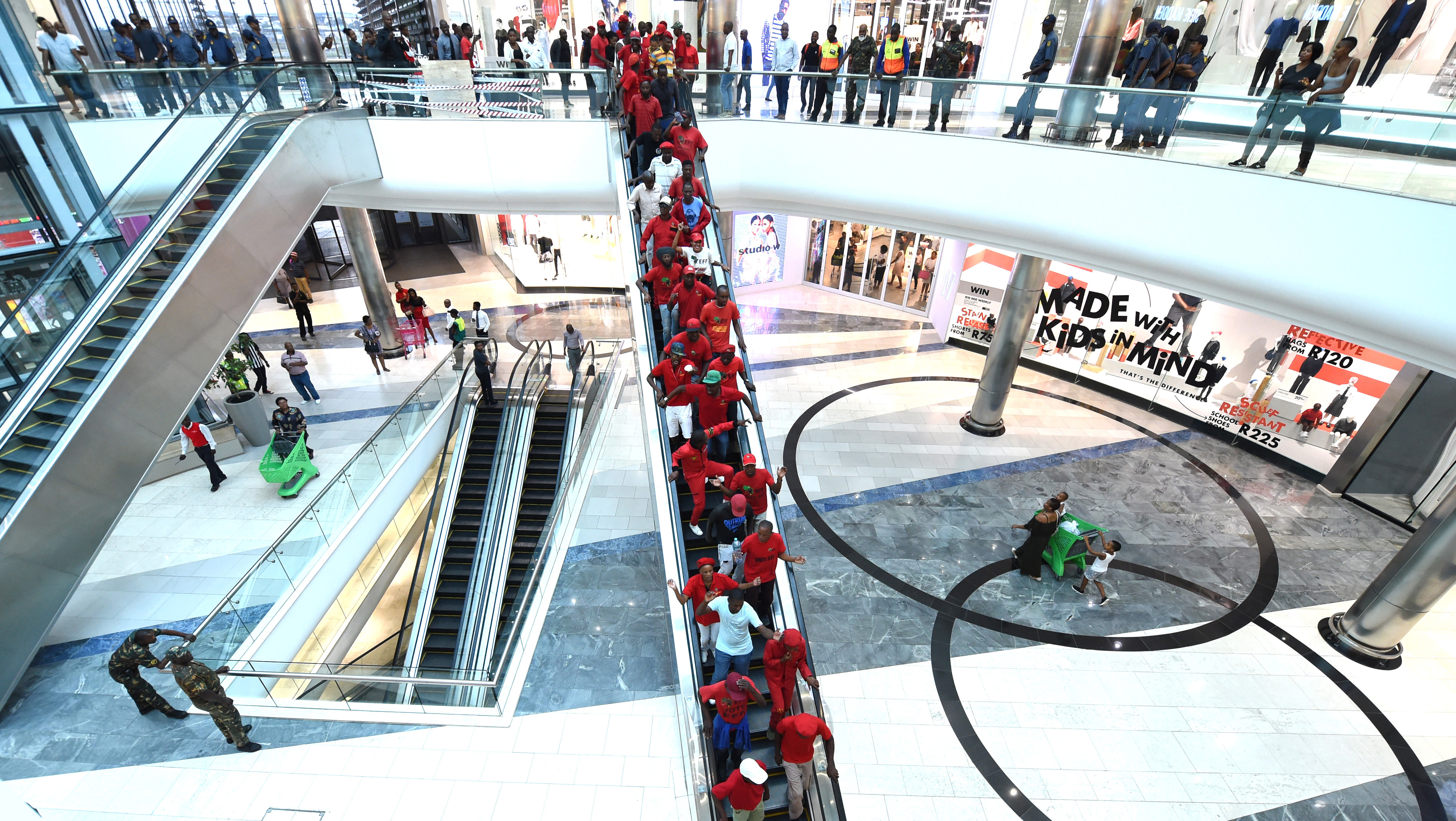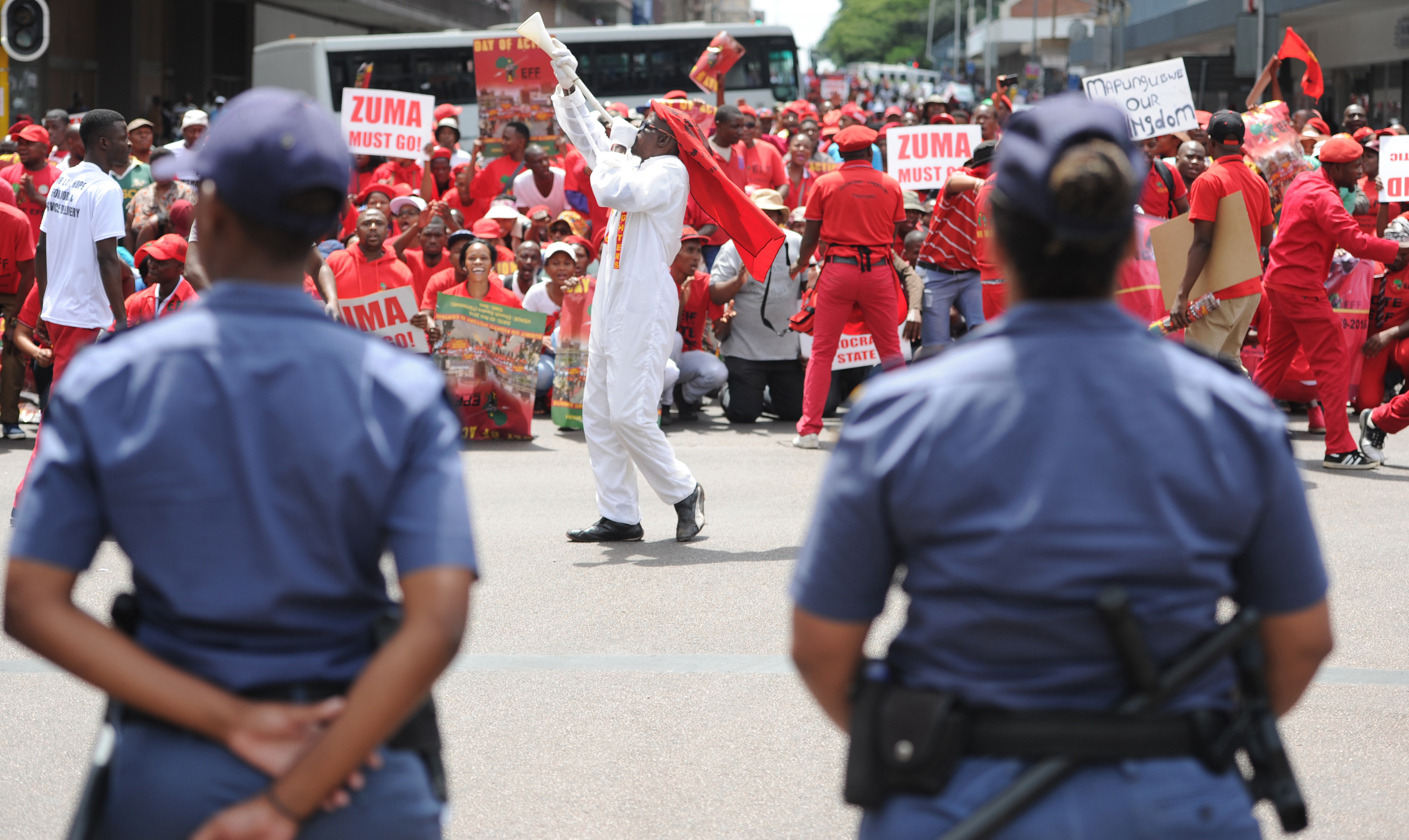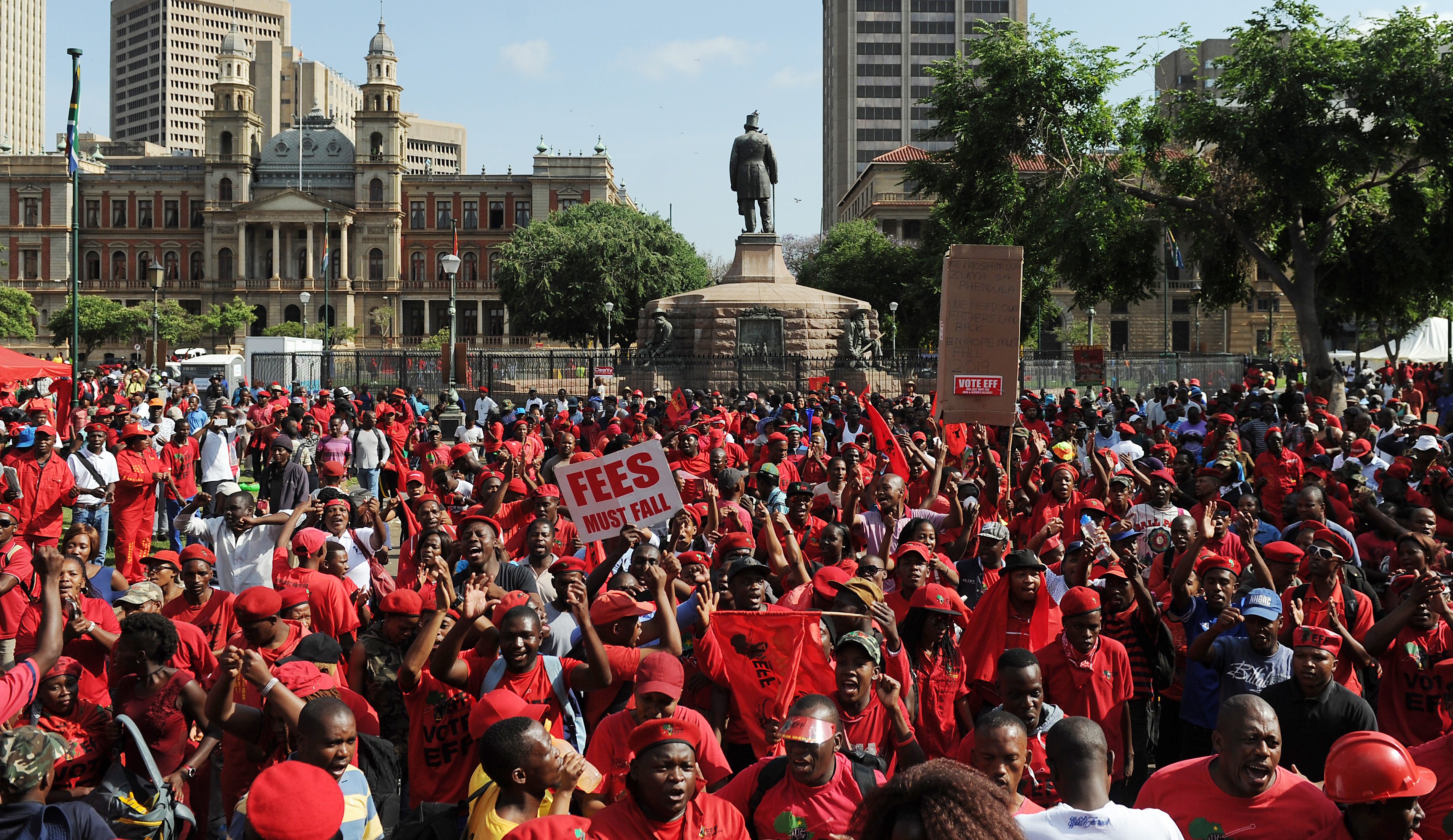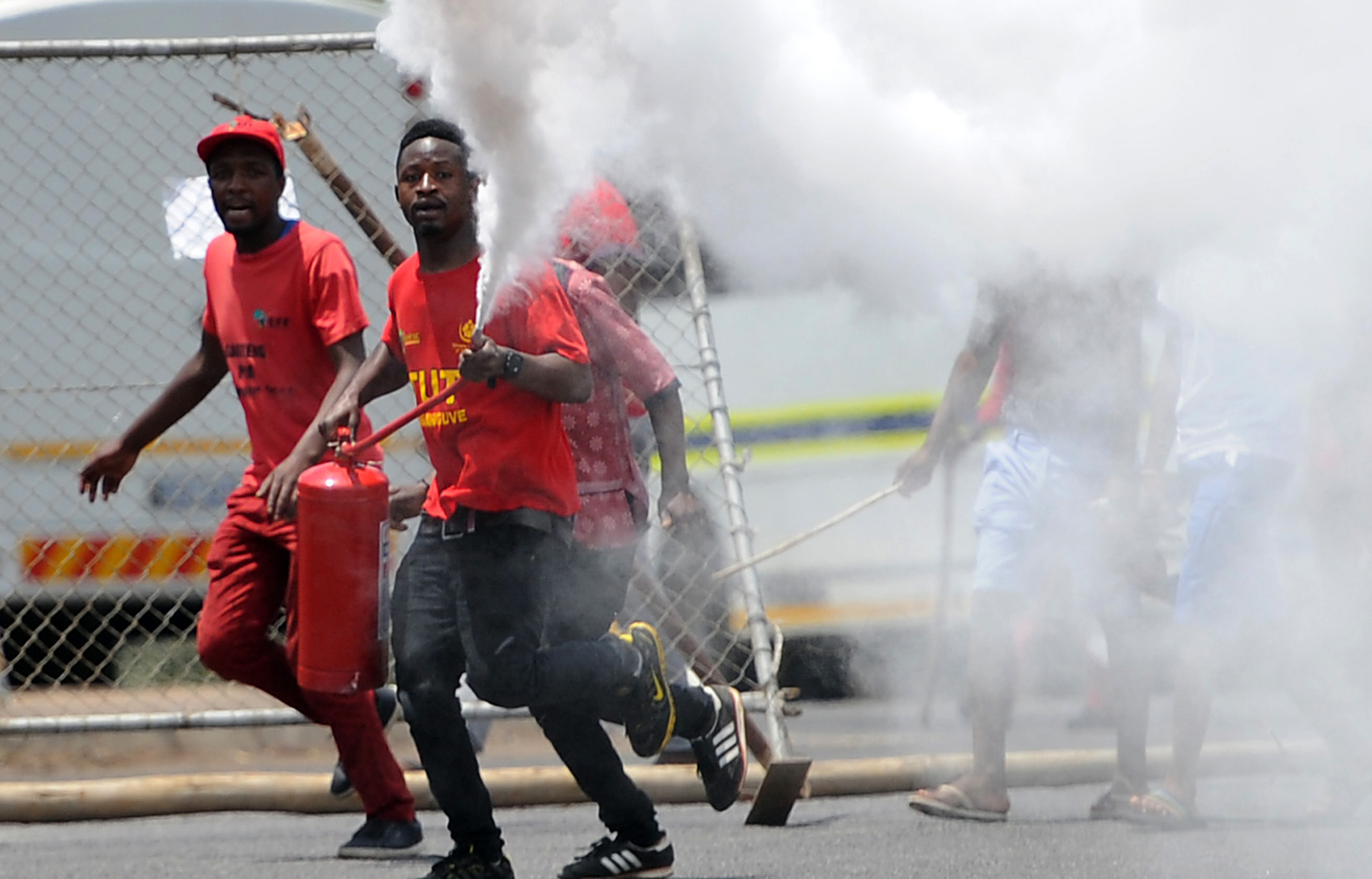What exactly is the EFF planning to do on Monday, 20 March?
They have called for a “National Shutdown to demand electricity and the resignation of Cyril Ramaphosa”. The party is asking all business and industrial activity to stop for the day, and for all workers and students to stay at home.
In addition, there will be marches in major cities — but the locations are deliberately being kept a secret by the Economic Freedom Fighters (EFF), leader Julius Malema said in a press briefing on Wednesday, to avoid the police.
 Members of the Economic Freedom Fighters protest against the H&M store in the Mall of Africa in Johannesburg on 15 January 2018. EFF members vandalised H&M stores after an advert with an African boy wearing a sweatshirt with a design that sparked racist complaints. (Photo: Gallo Images / Netwerk24 / Felix Dlangamandla)
Members of the Economic Freedom Fighters protest against the H&M store in the Mall of Africa in Johannesburg on 15 January 2018. EFF members vandalised H&M stores after an advert with an African boy wearing a sweatshirt with a design that sparked racist complaints. (Photo: Gallo Images / Netwerk24 / Felix Dlangamandla)
Aren’t a bunch of people off work on Monday anyway?
Correct. Because Tuesday, 21 March is a public holiday — Human Rights Day — many people are planning on taking off Monday anyway to create an extra long weekend. Many schools are also closing on Monday. All that is entirely independent of the EFF’s demands.
Calling for a shutdown on Monday, then, is something of a masterstroke for the EFF, given the widespread pre-existing plans not to work on that day anyway. This will permit the Red Berets to take credit for a cessation of activity that they had absolutely nothing to do with.
Read more: March 20th: EFF’s Day of Thunder/Slumber is approaching, and SA is still nonplussed
How have they been advertising the day?
It is no exaggeration to say that the party has gone all out. Street posters advertising the shutdown have been put up in all major cities, which can be an expensive business. EFF-branded bakkies have also been witnessed cruising the streets with loudhailers, warning businesses to shut down on Monday, 20 March or face looting.
The EFF first announced this shutdown in mid-January. If the day is a failure, it will be a major embarrassment for the Fighters — who can nonetheless be expected to claim it as a triumph regardless of the reality.
Why has the proposed shutdown been so controversial?
A few reasons. One is that shutdowns are hellishly expensive; the DA estimates that this one could cost the already moribund economy some R1.2-billion.
But primarily, the controversy is inextricably linked to the fact that the shutdown is being organised by the EFF — a party whose public association with violence was most recently cemented at President Cyril Ramaphosa’s State of the Nation Address, when EFF MPs stormed the stage and seemed to be heading straight for the President until security intervened.
 Members of the Economic Freedom Fighters on a march against State Capture in Pretoria on 2 November 2016. (Photo: Gallo Images / Beeld / Felix Dlangamandla)
Members of the Economic Freedom Fighters on a march against State Capture in Pretoria on 2 November 2016. (Photo: Gallo Images / Beeld / Felix Dlangamandla)
As such, there is a reasonable expectation that the shutdown may be accompanied by some degree of disorder. Party leaders, who are masters of doublespeak as always, have contributed to this perception through the aforementioned instructions to local businesses to shut down or potentially be looted.
On the one hand, this could be interpreted as a responsible attempt to safeguard businesses if party members get out of hand despite the best efforts of EFF leadership to control them. On the other hand, the instructions can also be read as a veiled threat: cooperate with our shutdown or face the consequences.
There have also been unconfirmed reports, from Gqeberha and Emalahleni, of abandoned tyres suddenly turning up at intersections and other central locations which may be intended for burning during Monday’s protest action.
Visit Daily Maverick’s home page for more news, analysis and investigations
In parts of the country badly affected by the July 2021 riots, the atmosphere is particularly tense. Residents of small towns on the outskirts of Durban told Daily Maverick this week that communities were braced for a repeat of the July 2021 carnage which saw hundreds left dead. Scars still run very deep in these areas, with an apparently widespread perception that neither the media nor authorities properly grasped the scale of the chaos and violence in KwaZulu-Natal that accompanied the jailing of former president Jacob Zuma.
It is important to note, though, that at this stage fears of violence are just that: fears. There is no credible information at this point to suggest that a deliberate campaign of violence is planned — and stoking panic would be massively irresponsible given the potential for deathly vigilantism, as happened in the July 2021 riots.
In a statement on Tuesday, the EFF said that the idea that the shutdown would be characterised by violence was a “fallacy” premised on “the racist presumption that African people have no capacity to express themselves in a peaceful manner”.
 Economic Freedom Fighters supporters protest during a march in Pretoria on 2 November 2016. (Photo: Gallo Images / Beeld / Felix Dlangamandla)
Economic Freedom Fighters supporters protest during a march in Pretoria on 2 November 2016. (Photo: Gallo Images / Beeld / Felix Dlangamandla)
But Malema did little to defuse tensions over the event at his Wednesday press briefing. There, the EFF leader taunted the national police commissioner, referred to the shutdown as the beginning of a “revolution”, and said anybody attempting to prevent EFF members from exercising their constitutional right to protest would “meet their maker”.
He also rather cunningly suggested that any violence erupting out of protests in the Western Cape would be the result of “agents provocateurs” paid by the DA to stir up trouble in the EFF’s name.
Are any other groups participating in the protests?
Malema says that the South African Federation of Trade Unions (Saftu) will be joining in, although other unions are steering clear. The Pan Africanist Congress of Azania and the Land Party are allegedly also participating, but this should add negligible numbers. There appears to be some degree of buy-in from student unions.
A number of other industry bodies have expressed vocal disapproval of the event, with the South African National Taxi Council (Santaco) saying taxis will run as normal because “the economy is already messed up and we don’t want to be adding more fuel to the fire”.
How have authorities responded?
The police have said that the National Joint Operational and Intelligence Structure (NatJoints) is readying itself to ensure that there is no criminality on the day.
By far the most robust response in advance of the shutdown has come from the DA and the City of Cape Town, with the blue party doing what it does best: going to court. Cape Town Mayor Geordin Hill-Lewis has been adamant that it will be business as usual on Monday.
The DA’s lawyers have also drafted “a template affidavit that can be used by any business owner who has been intimidated by any EFF representatives, to report such behaviour and press a formal charge of intimidation against the leadership of the EFF and local representatives who act on behalf of the EFF’s national leadership, and to request that the SAPS prevent, combat and investigate any violation of the legislation that regulates demonstrations, gatherings and events in South Africa”.
What’s the sense from the rest of South Africa?
It seems many people are torn between being sick of load shedding and sick of EFF stunts: on social media, where the EFF usually enjoys disproportionate support compared to their real-life polling figures, there has been a surprising degree of pushback to the idea.
A number of civil society groups have condemned the shutdown. The South African Christian Leadership Institute called on the EFF to reconsider its plans, suggesting: “Instead of intimidating workers on their way to work, let us cheer them on and find ways to provide more opportunities for gainful employment into active work.”
The ANC is unsurprisingly less than impressed with the project. A statement from the ruling party on Wednesday said: “There is absolutely nothing revolutionary about the EFF march, but rather a populist effort that seeks to promote lawlessness and a feeble attempt to invoke the Arab Spring Revolution mindset.”
It continued: “The ANC joins South Africans from all walks of life who have condemned this shutdown in the strongest possible terms. These attempts at insurrection and overthrow of a democratically elected President from a party that has failed to garner more than 6% of the national vote must be exposed for what they are. Our people should not be hoodwinked into supporting anarchy and violence under the pretext of service delivery.” DM




 Economic Freedom Fighters supporters protest during a march in Pretoria against State Capture on 2 November 2016. (Photo: Gallo Images / Beeld / Felix Dlangamandla)
Economic Freedom Fighters supporters protest during a march in Pretoria against State Capture on 2 November 2016. (Photo: Gallo Images / Beeld / Felix Dlangamandla) 